Keyword Research Trends in 2020 Your Team Should Follow
For every content marketing strategy, keyword research is crucial for the success of the site. Without a good keyword research strategy, you won’t get traffic, conversions, and sales.
Marketers will need to employ strategies to make their content and businesses found on voice search too. Voice search is unique and uses language just like humans to interpret user intent.
Anchor text distribution is being intelligently made by link building agencies. Here, you’ll be able to make your anchor text relevant to the content of your website.
Keyword research always starts with what your customer wants, the demand, and their end goal.
- Are they searching because they want to buy something?
- Are they searching because they have a question and are looking for the answer?
- Are they looking for more information about a place?
The purpose of doing keyword research is to lead customers from the search results to your website. With Google’s frequent update to its algorithm, you should always remain update-to-date with the current trends.
You can know what customers search online with the help of tools and non-tools.
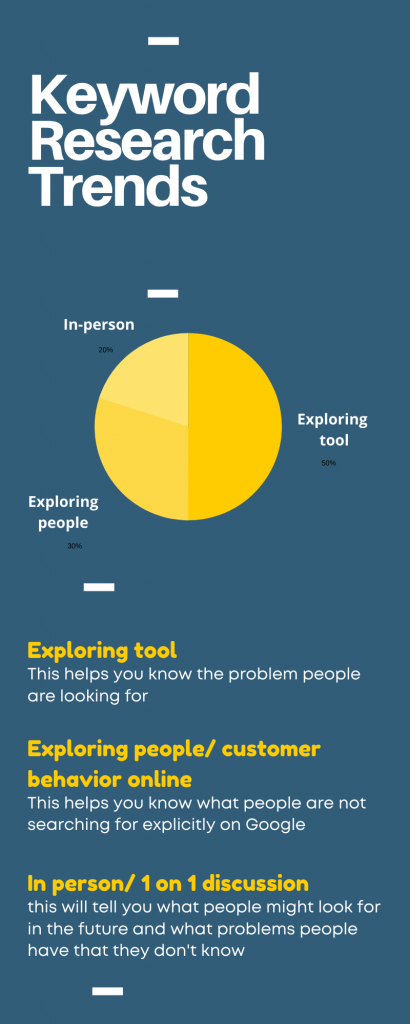
1. Using tools
Answer The Public
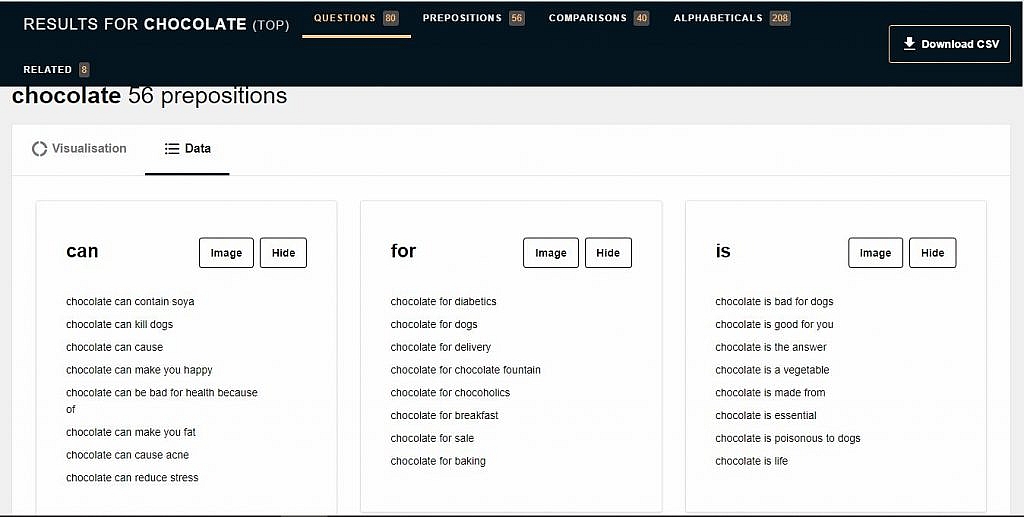
Answer The Public gives you the option to select the country and language to research the keyword you want. The results are then categorized into questions, prepositions, comparisons, and alphabetical. It will appear in the form of a visual chart or listicle data according to your choice.
Google Trends
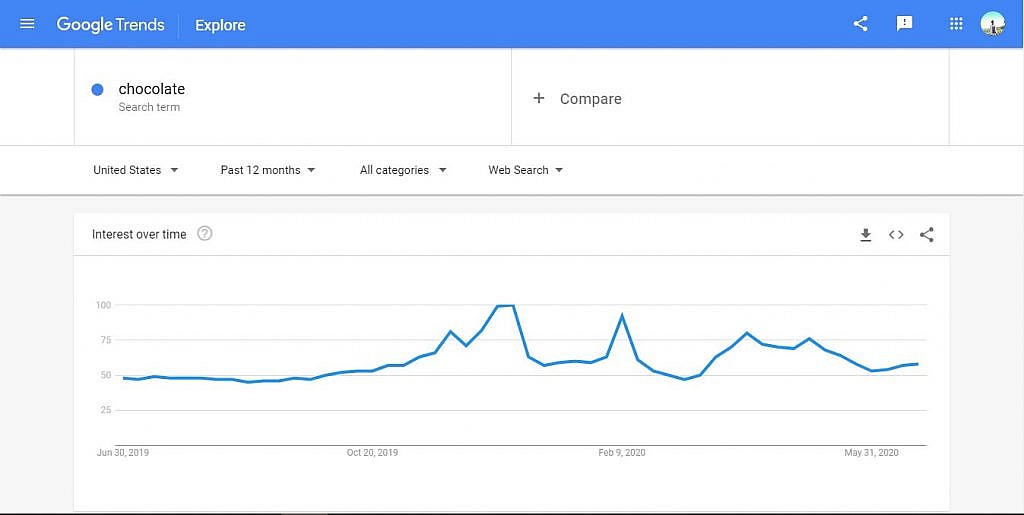
Google Trends help you find the trends for a particular keyword. This information will help you determine whether to write content for the keyword you choose or not.
You can use Google trends to discover the popularity of a keyword for a specific time. You can determine this by region if you like.
Also, Google Trends generates user queries and related topics that might give you ideas for content.
KeywordTool.io
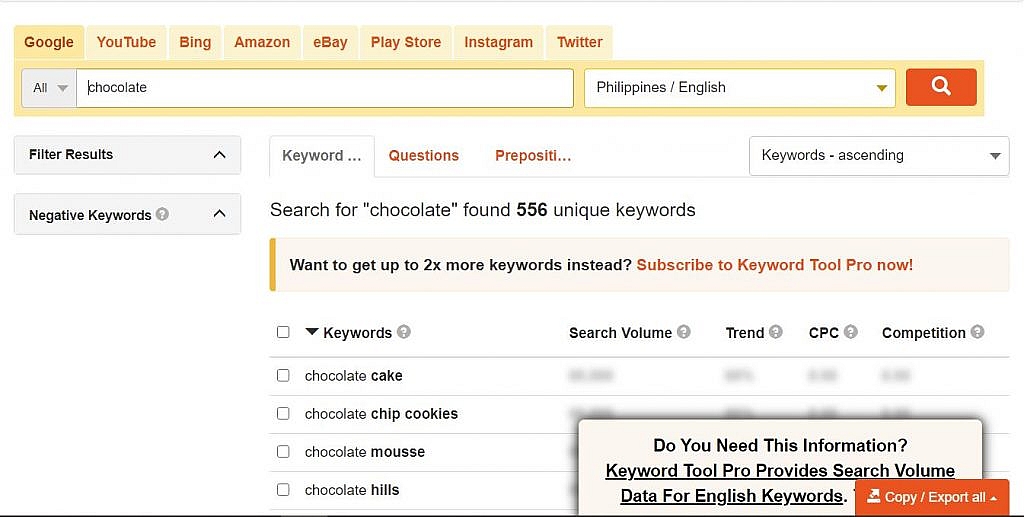
KeywordTool.io is different from other tools because it gives you information for how many people search for a specific keyword or keyword phrase on other search engines, stores, and social media platforms.
You will get a clear idea of the questions users frequently ask for and the prepositions they use. It also provides a filter that you can use to look for a specific keyword phrase.
WebFX
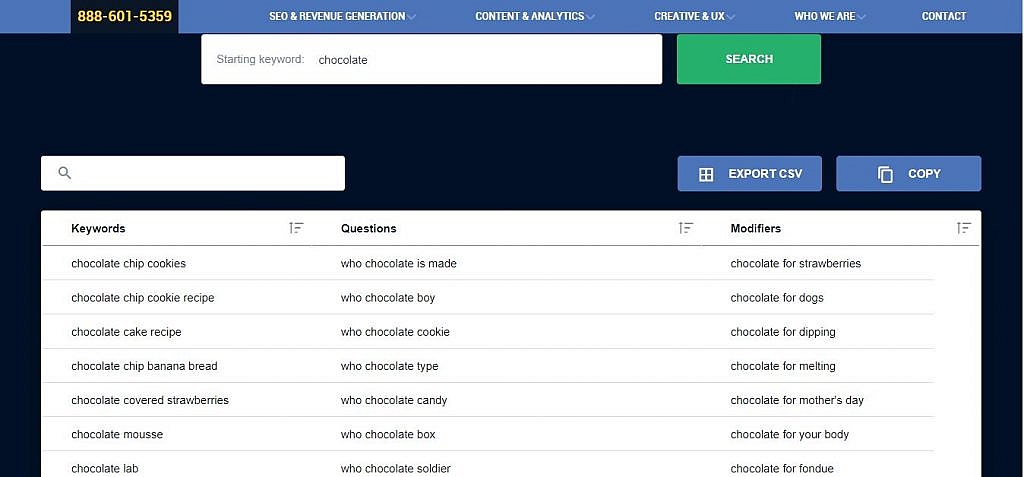
WebFX is a simple tool that will help you find what your customers are looking for. It will show you a list of keyword phrases they type in search engines and their modifiers. You will also see questions that you might answer.
Infinite Suggest
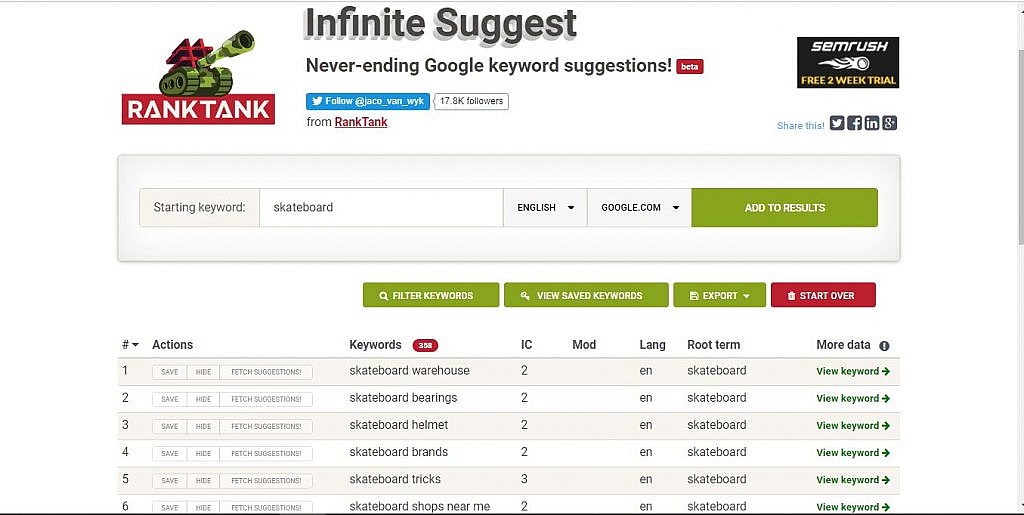
Infinite Suggest is a great app for keyword suggestions. It will generate over a hundred keyword phrases that come from their root term. You can select any keyword phrase you like to get more ideas.
AlsoAsked.com
AlsoAsked is a unique tool for keyword research. This tool generates questions from a keyword you searched for. It expands these questions three times from general to specific. You can click one of these questions to create more.
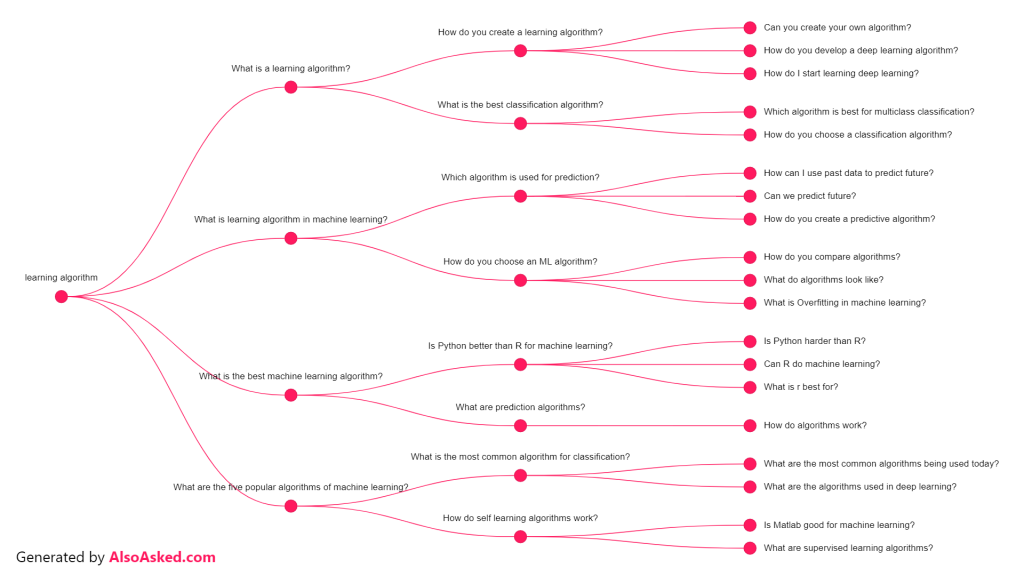
Play Stores and Product Stores
One tool you can use to know what your users want is the Play Stores. Google Play Store and the iOS App Store are the most common play stores available. For this example, we choose Google Play Store.
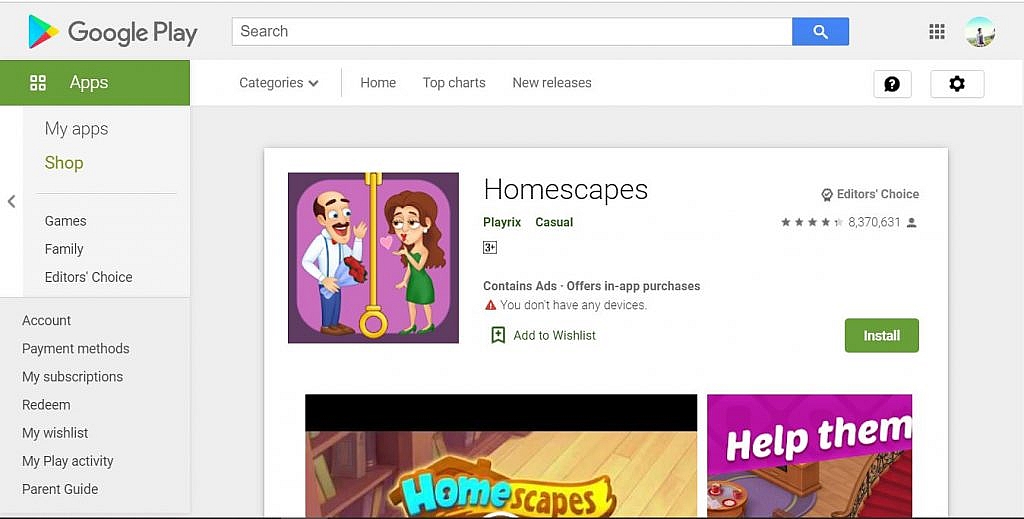
If you have a product such as an app, a book, and a movie, the Google Play Store is a great place to upload it.
When users see your product, they will download it for free or buy. After using the product, they can write about their experiences with it.
Marketers can take advantage of the reviews feature to see what users liked and disliked about the product. This information will help them create recommendation content for apps, books, and movies for the customer.
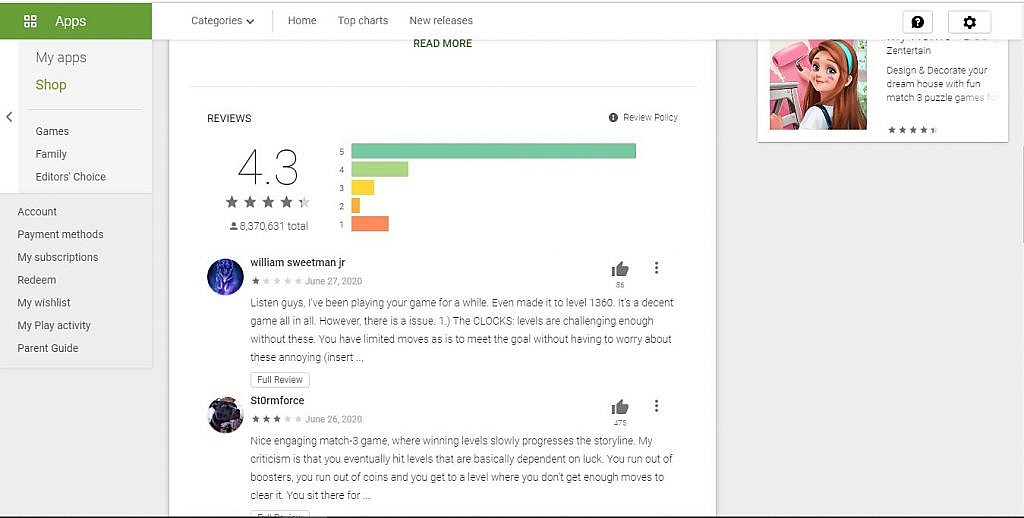
Another tool you can use is the product stores. These include eBay, Amazon, AliExpress, Alibaba, and so much more. For this example, we choose Amazon.
Sellers write descriptions of their product, provide a price, and then post them on these platforms.
You can use product stores to find the popular products the customers are searching for by looking at the product categories, customer reviews, brands, and price range.
These will determine what kind of content they might be interested in.
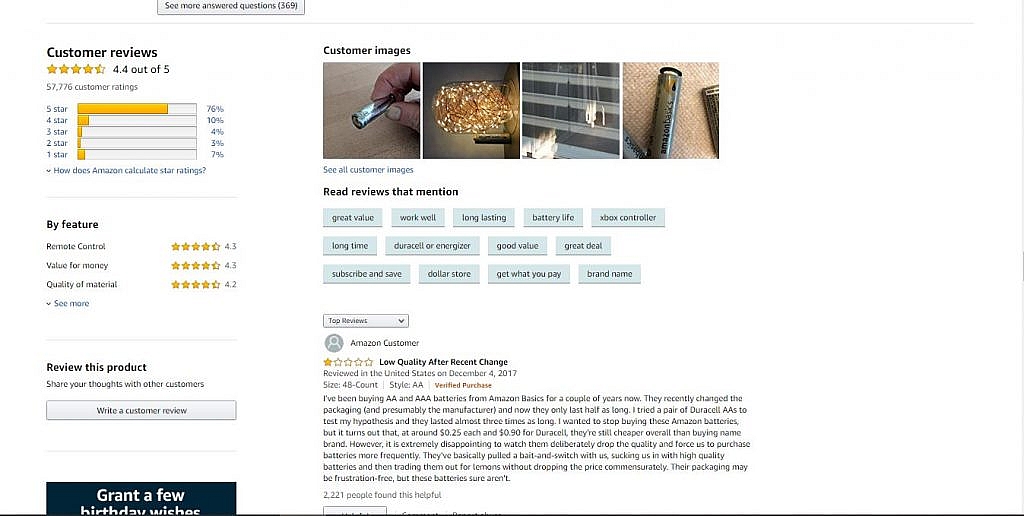
Another feature you might want to look at is the customer questions and answers section. This is an area where customers will go to find more information about the product they’re interested in. You can use the information here to get ideas for your site.
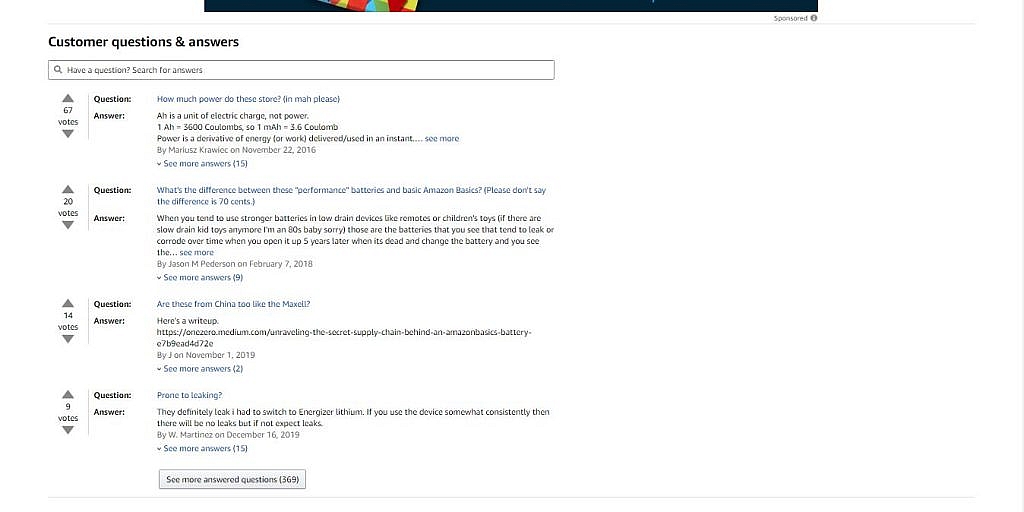
Extract comments and create a word cloud
Commenters email
If you have a website, having an email list is essential. It helps you connect with your customers more efficiently as opposed to social media. Here is a list of some popular email marketing services.
- ConvertKit
- Mailchimp
- AWeber
- Constant Connect
Comments from blogs will help you improve your blog post because readers know what they’re looking for. By reading a customer’s feedback, you can get a clue of what their interests are, what problems they want to solve, the information they want to know more.
Here’s how to extract comments using a word cloud.
- Step 1: Copy the text from the email you want to create a word cloud
- Step 2: Go to WordItOut website and paste in the text box. Select generate.
You’ll see an attractive arrangement of randomly positioned words, where the important words are bigger than the others.
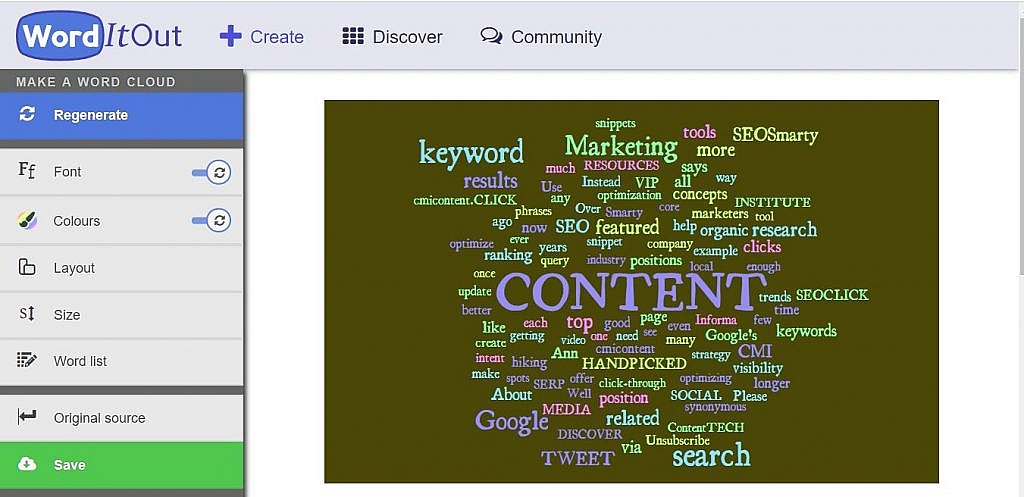
Forum
A forum is a place where people share ideas and on a particular subject. Customers go to forums to look for answers to their questions, learn new things, seek advice, and more. Here are examples of popular internet forums.
- XDA Developers Android Forums
- Craigslist
- Quora
- Stack Overflow
- Steam community
- Tumblr
First things first, you should find a forum that is in your niche. Then spend some time reading the forum to get a sense of the community norms. Find out who the influencers are and note their topics. By doing this, you can understand your audience better.
Social media comments and discussion
More people than ever are actively searching on social media using hashtags and trending topics. When they use social media, they’re not only looking for answers to their problems, but they also want a conversation.
Through social media, you can learn about your customers through their experiences. This means that you’ll have a lot of information to collect, and you’ll be able to produce valuable content.
3. Ask questions in interviews/ podcast
Asking questions in interviews and podcasts is an opportunity for you to learn about your audience. You’ll be able to get a clear picture of the kind of keyword related answers you’ll likely hear in these discussions.
For example, by attending a content marketing interview, you can ask experts about:
- the trends in SEO,
- how content marketing works,
- how content marketing can address our target audiences and more.
By doing this, you’ll learn new information about content marketing and also gather new keyword phrases.
4. Reverse engineer your competition
- Step 1: Select the best performing article of your competitor that you’re targeting to beat.
- Step 2: Input the URL in the “Keyword density checker tools.” An example of a keyword density checker tool is SmallSEOTools Keyword Density Checker. This is how you’ll get results.
- Step 3: Use the result to improve your content or write new content
Extra Tip: Why Brands Need a Voice Search Strategy
According to Google, 27% of the global online population is using voice search. This is a tremendous development impacting digital marketing. The reason for this growth was the invention of smart speakers and personal assistants.
2.8 million smart speakers were sold in the first quarter of 2020. This means that many homes today at least own a smart speaker. People use smart speakers to ask for information, entertainment, and perform simple tasks.
Conclusion
Keyword research is the key to a successful content marketing strategy. Knowing the current trends is a plus. If you want to optimize your site and produce valuable content for your audience, you should use both the tools and non-tools to understand your target audience.
Photo by Solen Feyissa on Unsplash
